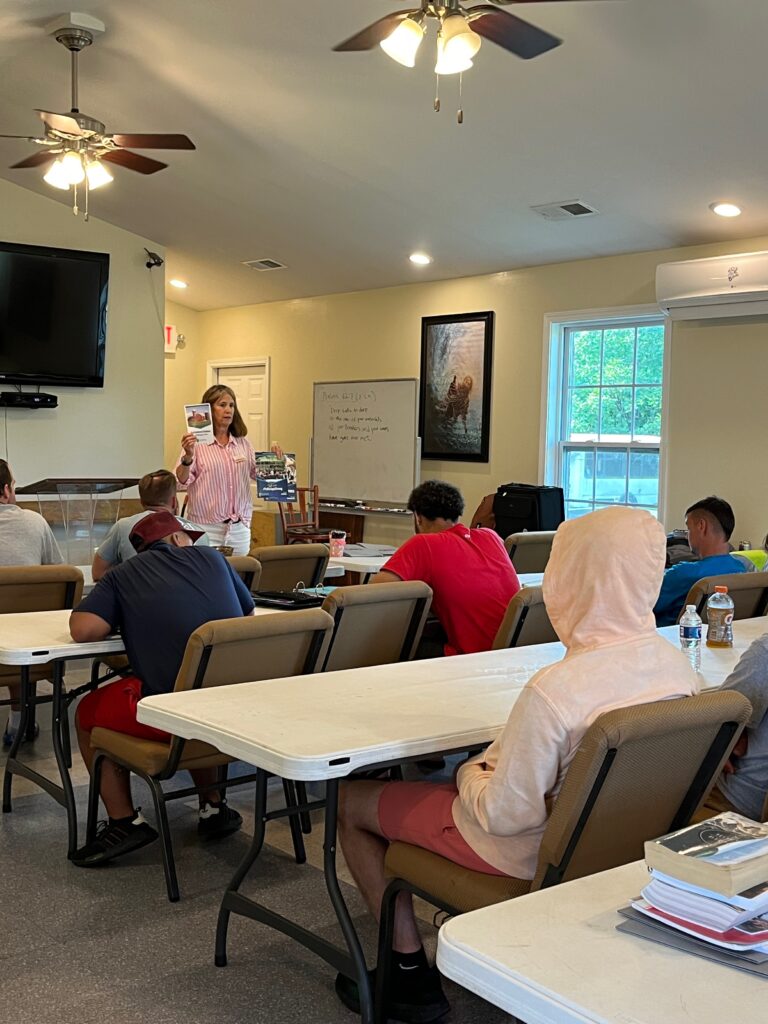by Karina Beltrán
For the past two years, the Educational Opportunity Center (EOC) has been dedicated to empowering formerly incarcerated individuals by providing them with the educational guidance and career resources needed to successfully reintegrate into society. Many of these individuals face unique challenges upon reentry, including limited job opportunities, restricted access to higher education, and the stigma associated with a criminal record. EOC helps bridge these gaps by connecting them with educational programs, technical training, and financial aid options, ensuring they have the tools necessary to build a stable future.
A large number of the individuals EOC serve that have been formerly incarcerated currently reside in transition houses. These are structured environments designed to support their reintegration. These homes provide stability but also come with strict schedules, mandatory courses, and supervised programming to help residents develop essential life and job skills. While these structured settings offer necessary support, they can also make it difficult for individuals to navigate the complex processes of enrolling in college or vocational training. EOC works directly with these individuals, offering personalized one-on-one guidance, coordinating with community colleges and trade schools, and assisting with financial aid applications to remove as many barriers as possible. By stepping in at this critical time, EOC not only helps individuals see themselves as capable of post-secondary education but also provides a clear roadmap to meaningful employment. Education is one of the most effective tools in reducing recidivism, and EOC is committed to ensuring that formerly incarcerated individuals have every opportunity to succeed beyond their past and build a future filled with possibility.
Encouraging Education as a Pathway Forward
A significant challenge for many formerly incarcerated individuals is that while they often complete their GEDs in prison, they have no college or vocational experience and may never consider themselves as college material. This is where the EOC steps in by helping them see post-secondary education as a viable option and guiding them through the process. Through one-on-one conversations, meetings with community college and technical program representatives, and direct support, EOC helps individuals take the first steps toward career-focused education. One key resource is Tennessee College of Applied Technology (TCAT), which offers re-entry grants specifically for formerly incarcerated individuals, covering the cost of technical training programs such as welding weekend classes.
Overcoming Barriers Beyond Education
While access to Pell Grants provides financial aid for post-secondary education for incarcerated individuals, the reality is that most prisons do not offer college programs, leaving many individuals without the opportunity to continue their education while incarcerated. Even after release, barriers remain, particularly in employment. Felony records can restrict access to certain fields, especially those requiring healthcare board certifications due to past drug offenses. This is why EOC works closely with community partners to understand the ever-changing landscape of board certification requirements. Additionally, EOC works to provide workforce development services, helping individuals secure funding for essentials like transportation, tools, and tuition. Many of the individuals EOC serves are referred through their parole programs and take great pride in enrolling in technical training programs that lead to stable careers.
A Supportive and Safe Environment
One common question about EOC’s work with this population is staff safety. Though safety is always a top concern among EOC staff and leadership, the EOC team has found that, our EOC team have found that formerly incarcerated individuals are often the most grateful and motivated individuals they work with. The process of filling out the FAFSA (Free Application for Federal Student Aid) alone can be a significant challenge, but with guidance, these individuals can navigate the system and access the resources they need.
Key Community Partnerships
EOC collaborates with Knox Midway Rehab which is a program supporting individuals. EOC staff are on-site weekly, offering walk-in consultations and one-on-one meetings to help participants explore career options and fully utilize Pell Grants for technical degrees. Additionally, EOC refers individuals to workforce development services that help cover costs like gas and tools for their training.
Education Reduces Recidivism
Nationwide data strongly supports the correlation between education and recidivism reduction. Studies have shown that as individuals attain higher levels of education, their likelihood of reoffending decreases significantly (U.S. Sentencing Commission [USSC], 2022). For instance, research indicates that participation in prison education programs is linked to lower recidivism rates. According to the U.S. Sentencing Commission’s Recidivism and Federal Bureau of Prisons Programs report, individuals who completed the Residential Drug Abuse Treatment Program were 27% less likely to be rearrested following their release, compared to those who were eligible but did not participate (USSC, 2022). Similarly, those who completed the Non-Residential Drug Abuse Treatment Program experienced a 17% reduction in recidivism (USSC, 2022). However, findings on vocational education programs were mixed. While Occupational Education Programs and Federal Prison Industries provide technical and job training, the report found no statistically significant difference in recidivism rates between participants and non-participants (USSC, 2022). This suggests that while vocational training is valuable for employment readiness, formal education and rehabilitative programs may have a greater impact on reducing reoffending.
These statistics reinforce the critical role of education in rehabilitation efforts. By providing accessible educational opportunities, organizations like the EOC play a vital role in helping formerly incarcerated individuals rebuild their lives, access meaningful careers, and contribute positively to their communities. The evidence is clear, the more education a person receives, the less likely they are to re-offend. By breaking down barriers and providing accessible pathways to education and career opportunities, EOC plays a crucial role in helping formerly incarcerated individuals rebuild their lives and contribute positively to their communities. Through education, support, and opportunity, EOC continues to be a path for second chances.

U.S. Sentencing Commission. (2022). Recidivism and educational attainment. https://www.ussc.gov/research/research-reports/reports-glance-recidivism-and-bop-programs
Vera Institute of Justice. (2019). Back to school: A common-sense strategy to lower recidivism. https://www.vera.org/news/back-to-school-a-common-sense-strategy-to-lower-recidivism

Stephanie Langley serves as the Project Director for EOC. She is dedicated to supporting the people of Central Appalachia, including Knoxville, TN, and surrounding rural communities across East Tennessee, Western North Carolina, and North Georgia.
